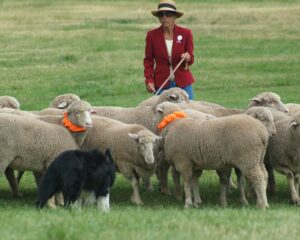From Amelia Smith
In our trial series, trial tips from top hands, this one comes from our own OSDS VP, Amelia Smith. Amelia has been training and trialing Border Collie sheepdogs for over 25 years and has competed around the country and as far away as Great Britain and Ireland. Currently, she works for a ranch on the south Oregon coast managing their flock of commercial breeding ewes in addition to maintaining a long-standing career in real estate.
![]()
![]()
![]()
![]()

Amelia has this to say about retiring from the post
Most of us drive a long way to attend trials and don’t get to go to very many. At least I don’t. It’s reasonable that we want to make the most of the experience by staying on the field as long as possible.
I have a different view of making the most of the experience and what it means to me has nothing to do with how long I stay at the post when things go south. Getting my dogs to new places on sheep unknown to them, with bad weather and geography, unfamiliar people, strange dogs, and the smells and noise that go along with that is my idea of experience. Letting them feel the pressure of competition and learning to adapt to how my handling changes when I feel it too falls under experience as well.
If my dog is struggling on the trial field, I only make things worse for him in the long run when I press on. At some point, the struggle becomes a negative experience for the dog and does more harm than good.
Will I ever stay on the field even after I’ve lost enough points to take me out of the placing? It depends. When my young dog crosses on the outrun, if we pull the run back together shortly thereafter, and I’m talking the lift and fetch here, I may continue just for training purposes. I wouldn’t do this with an aged and fully trained dog. And I wouldn’t stay on with any dog if I knew the trial was pressed for time. I do my level best to be considerate of hands behind me and the trial host’s intent to have their event run smoothly and on time. For me, that’s proper etiquette and good sportsmanship.
If my dog can’t lift sheep or they stop moving off him at any point during my run, I will always, always go help my dog sooner than later. To allow a dog to be faced off and stalled by the sheep erodes precious confidence, so I am particularly mindful of this. Especially when you consider that a dog faced down by sheep is lacking it anyway. Confidence is the one thing the very best sheepdogs all have in common. And once it’s gone, you will never get it all back. So, I go right out and help my dog get things moving again on my way to exhaust. You’re not going to win or even make a good showing at the tough trials, like Meeker and the finals without a confident dog. Building and retaining confidence in a dog is the cornerstone of good training. Or, as my good friend, Tommy Wilson told me, “oh, aye, the dog must always win.”
If any of my dogs take a necessary grip, one that gets sheep moving, but doesn’t leave a mark or stress them, I may continue if the judge agrees and lets me. My overriding concern on the trial field at every trial is for the condition of the sheep. If I can’t handle my dog to keep from stressing sheep by chasing, biting, or treating them rashly, I will always walk to save the sheep and then head back to the practice field and remedy the problem.
For me, there is absolutely no reason to stay on if the sheep are stressed and this includes becoming breathless or hot from being harassed by my dog, becoming panicked from rash treatment by my dog, and if sheep lay down and refuse to move for any reason. I’m not going to be competitive. It wasn’t my day. I will leave the post, control my dog and help the sheep. To me, that’s proper animal welfare and absolutely in the very best interest of our sport.
Once I do retire, I don’t train my dog on the way to exhaust. If an exhaust person is appointed to help, I will stop sheep from getting away or get them pointed in the right direction, but then happily and quickly move to the water bucket. If it’s my job to exhaust my sheep, I do so in the most expedient way possible, and I never use whistles on the way. Whistles distract the next dog up from looking up the field. It shouldn’t bother the aged dogs, but you never know and it’s so easy to avoid the risk and give the next hand the best chance. One of my pet peeves and more good sportsmanship.
Let’s face it, after I’ve dropped more points than I can likely place with I’m not getting them back no matter how well the rest of my run goes. While competing, there are two main considerations for whether I stay at the post. And neither has anything to do with how far I drove or how much money I spent. First and foremost, are the sheep happy, and then, am I competitive with the run I have going? If the answer to both of these is no, then I happily retire, pat my dog and go back to the drawing board. A wise man taught me to always remember what I do right in competition. Sometimes that is a timely retire from post in the best interest of my fellow competitors, the trial host, the sheep, and my dog.